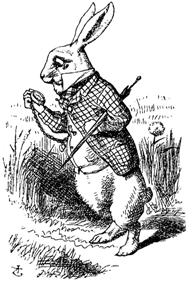|
| ||
|
| ||
What is Anthropomorphism?
The term anthropomorphism derives from the combination of the Greek ἄνθρωπος (ánthrōpos), "human" and μορφή (morphē), "shape" or "form". According to Wikipedia the term denotes the attribution of human characteristics to non-human creatures and beings, phenomena, material states and objects or abstract concepts. Examples include animals and plants depicted as creatures with human motivation able to reason and converse and forces of nature such as winds, rain or the sun. A good popular example is John Tenniel's depiction of this anthropomorphic rabbit featured in the first chapter of Lewis Carroll's Alice's Adventures in Wonderland. In religion and mythology, the term refers to the perception of a divine being or beings in human form, or the recognition of human qualities in these beings. The key feature of anthropomorphism is the deeply embedded presumption that anything anthropomorphic (i.e. human like) is far superior to anything which is not. Traditionally that kind of self-serving in-group favoritism has had a profound effect on human attitudes towards species such as snakes and centipedes but it may turn to be particularly important towards other intelligent (or AI) entities which do not exhibit human-like features. The alleged superiority of our own species comes from our (so far) unchallenged reign at the top of the food chain and the perception that we are (at) the pinnacle of evolution. It is this inherent anthropomorphism that Nick Bostrom calls bioism or speciesism both of which stand for the favoring of biologically based intelligence and, even more narrowly, the favoring of our particular human species. In Ethical Principles in the Creation of Artificial Minds Bostrom argues that bioism (or speciesism) has to be resisted on the same moral grounds as racism: "Principle 1: Non-discrimination with regard to substrate [i.e. biology] Substrate is morally irrelevant. Whether somebody is implemented on silicon or biological tissue, if it does not affect functionality or consciousness, is of no moral significance. Carbon-chauvinism is objectionable on the same grounds as racism." If we take the above argument a step further we may conclude that, similarly to different races within our species (e.g. Black or White humans), two or more intelligent species (or entities) are unlikely to co-exist peacefully unless there is a common framework of mutual respect, tolerance and equality. Thus, some of the main issues here are: Does substrate matter? Can the human race overcome its inherent anthropomorphism and tolerate AI or other non-biological intelligences? Should AI entities have the same rights as humans? Is it time to move beyond the good old-fashioned (and highly anthropomorphic) "Human Rights" and start thinking about "Intelligence Rights?" Do you want to sumbit your own singularity content?Do you agree or disagree with the content of this page? Do you want to improve it? Do you want to post some great singularity content of your own? Why not share it here at Singularity Symposium?! What Other Visitors Have SaidClick below to see contributions from other visitors to this page...
Who but the "Art" in artificial? Not rated yet |
|
|
|
| ||
Quality content
| ||
|
Copyright © 2012 - www.SingularitySymposium.com - All Rights Reserved
| ||